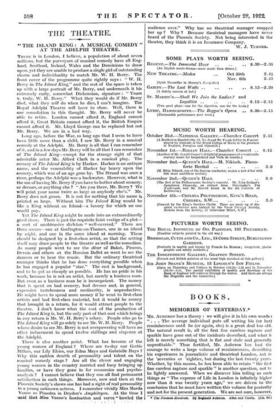THE THEATRE.
" THE ISLAND KING : A MUSICAL COMEDY " AT THE ADELPHI THEATRE.
TmmE is in London, I believe, a population of about seven millions, but the purveyors of musical comedy have all Eng- land, Scotland, Ireland, Wales and the Dominions to draw upon, yet they are unable to produce a single girl of outstanding charm and individuality to match Mr. W. H. Berry. The front cover of the programme quite rightly says : " W. H. Berry in The Island King," and the rest of the space is taken up with a large portrait of Mr. Berry, and underneath it his extremely curly, somewhat Dickensian, signature : " Yours v. truly, W. H. Berry." What they would do if Mr. Berry died, what they will do when he dies, I can't imagine. The Royal Adelphi Theatre will have to close. Well, there is one consolation in this thought. Mr. Berry will never be able to retire. London cannot afford it, England cannot afford it, Great Britain cannot afford it, the British Empire cannot afford it. Mr. Lloyd George can be replaced but not Mr. Berry. We are in a bad way.
Long ago, before the War, so long ago that I seem to have been little more than a child, I saw Mr. Berry in a musical comedy at the Adelphi. Mr. Berry is all that I can remember of it, and in a few days Mr. Berry will be all that I can remember of The Island King—except for the strange sight of that admirable actor Mr. Alfred Clark in a musical play. The scenery of The Island King is by Harker. Harker is an antique name, and the venerability of Harker lay heavy upon the scenery, which was of an age gone by. The Strand was once a river, perhaps the Adelphi was a backwater. However, what is the use of having Mr. Berry if you have to bother about scenery, or dresses, or anything else ? " Are you there, Mr. Berry ? We will print your name twice as large as anybody else's." Mr. Berry does not groan. It is not for nothing that his name is printed so large. Without him The Island King would be like a King without an Island—a luxury for which no one would pay.
Yet The Island King might be made into an extraordinarily good show. There is just the requisite faint vestige of a plot— a sort of unobtrusive skeleton " well-covered." There are three scenes—one at Gorlington-on-Thames, one in an island by night, and one in the same island at morning. These should be designed by a first-class artist, so that the setting itself may draw people to the theatre as well as the comedian. As many people went to see the decor of Bakst, Picasso, Derain and others at the Russian Ballet as went to see the dancers or to hear the music. But the ordinary theatrical manager thinks that he has done everything possible when he has engaged a popular " star." The rest is background, and to be got as cheaply as possible. He has no pride in his work, because he is not an artist, but merely a business man. But even as a business man he is incompetent. The money that is spent on bad scenery, bad dresses and, in general, expensive tastelessness and mediocrity, is unproductive. He might have to spend more money if he went to first-class artists and had first-class material, but it would be .money that brought in a return, for it would attract people to the theatre. I don't know what the cost of the production of The Island King is, but the only part of that cost which brings in any return is Mr. W. H. Berry's salary. People who go to The Island King will go solely to see Mr. W. H. Berry. People whose desire to see Mr. Berry is not overpowering will have no other inducement to spend twelve shillings and sixpence at the Adelphi.
There is also another point. What has become of the young women of England ? Where are to-day our Gertie Millers, our Lily Elsies, our Edna Mays and Gabrielle Rays ? Why this sudden dearth of personality and talent on the musical comedy stage ? Are all the clever and engaging young women in the country married and busy bringing up families, or have they gone in for economics and psycho- analysis ? I cannot believe that they can all find permanent satisfaction in such things. Moreover, now and then at the Phoenix Society's shows one has had a sight of real personality in a young unknown actress. I remember vividly Miss Marda Vanne as Phaedra in Dryden's Amphitryon. At the time I isaid that Miss Venue's fascination and verve " bowled the audience over." Why has no theatrical manager snapped her up ? Why ? Because theatrical managers have never heard of the Phoenix Society. Not being interested in the theatre, they think it is an Insurance Company.
W. J. TURNER.










































 Previous page
Previous page